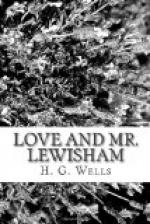“Nor I,” she said.
“Thank you for coming,” he said in an outburst of gratitude.—“Oh, thank you for coming,” and held out his hand. She took it and pressed it, and so they went on hand in hand until the village street was reached. Their high resolve to play truant at all costs had begotten a wonderful sense of fellowship. “I can’t call you Miss Henderson,” he said. “You know I can’t. You know ... I must have your Christian name.”
“Ethel,” she told him.
“Ethel,” he said and looked at her, gathering courage as he did so. “Ethel,” he repeated. “It is a pretty name. But no name is quite pretty enough for you, Ethel ... dear."...
The little shop in Immering lay back behind a garden full of wallflowers, and was kept by a very fat and very cheerful little woman, who insisted on regarding them as brother and sister, and calling them both “dearie.” These points conceded she gave them an admirable tea of astonishing cheapness. Lewisham did not like the second condition very much, because it seemed to touch a little on his latest enterprise. But the tea and the bread and butter and the whort jam were like no food on earth. There were wallflowers, heavy scented, in a jug upon the table, and Ethel admired them, and when they set out again the little old lady insisted on her taking a bunch with her.
It was after they left Immering that this ramble, properly speaking, became scandalous. The sun was already a golden ball above the blue hills in the west—it turned our two young people into little figures of flame—and yet, instead of going homeward, they took the Wentworth road that plunges into the Forshaw woods. Behind them the moon, almost full, hung in the blue sky above the tree-tops, ghostly and indistinct, and slowly gathered to itself such light as the setting sun left for it in the sky.
Going out of Immering they began to talk of the future. And for the very young lover there is no future but the immediate future.
“You must write to me,” he said, and she told him she wrote such silly letters. “But I shall have reams to write to you,” he told her.
“How are you to write to me?” she asked, and they discussed a new obstacle between them. It would never do to write home—never. She was sure of that with an absolute assurance. “My mother—” she said and stopped.
That prohibition cut him, for at that time he had the makings of a voluminous letter-writer. Yet it was only what one might expect. The whole world was unpropitious—obdurate indeed.... A splendid isolation a deux.
Perhaps she might find some place where letters might be sent to her? Yet that seemed to her deceitful.
So these two young people wandered on, full of their discovery of love, and yet so full too of the shyness of adolescence that the word “Love” never passed their lips that day. Yet as they talked on, and the kindly dusk gathered about them, their speech and their hearts came very close together. But their speech would seem so threadbare, written down in cold blood, that I must not put it here. To them it was not threadbare.




